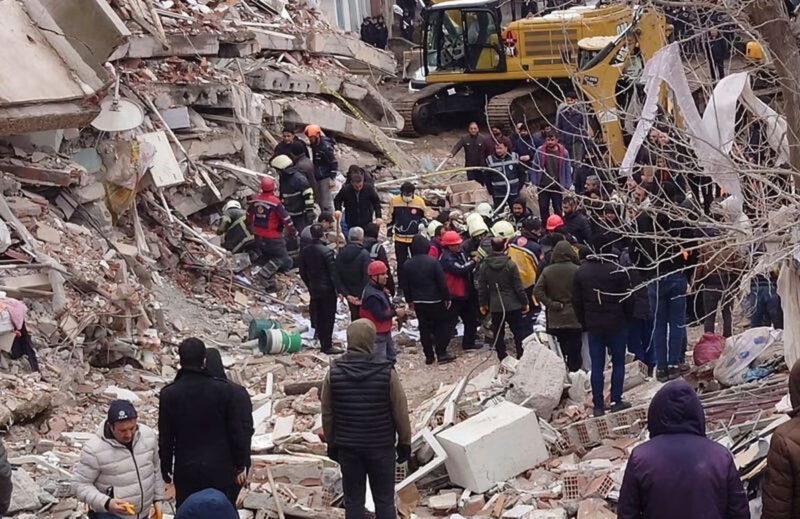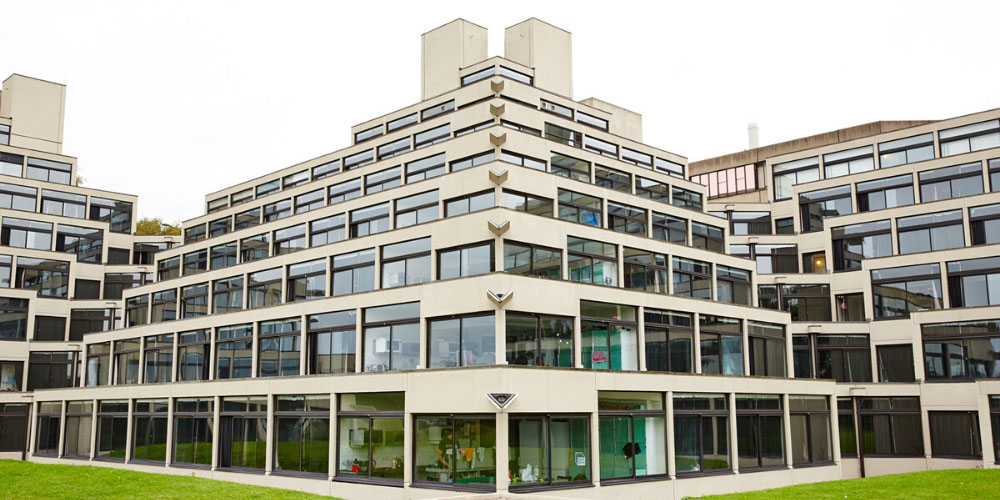The University of East Anglia (UEA) was founded in 1963 and is located in Norwich, a historic city in the east of England.
International
Over 1,300 killed as powerful quake rocks Turkey, Syria

A powerful 7.8 magnitude earthquake rocked southeastern Turkey and northern Syria early Monday, toppling hundreds of buildings and killing more than 1,300 people. Hundreds were still believed to be trapped under rubble, and the toll was expected to rise as rescue workers searched mounds of wreckage in cities and towns across the area.
On both sides of the border, residents jolted out of sleep by the pre-dawn quake rushed outside on a cold, rainy and snowy winter night, as buildings were flattened and strong aftershocks continued.
Rescue workers and residents in multiple cities searched for survivors, working through tangles of metal and giant piles of concrete. A hospital in Turkey collapsed and patients, including newborns, were evacuated from a handful of facilities in Syria.
In the Turkish city of Adana, one resident said three buildings near his home collapsed. “I don’t have the strength anymore,” one survivor could be heard calling out from beneath the rubble as rescue workers tried to reach him, said the resident, journalism student Muhammet Fatih Yavus.
Farther east in Diyarbakir, cranes and rescue teams rushed people on stretchers out of a mountain of pancaked concrete floors that was once an apartment building.
The quake, felt as far away as Cairo, was centered north of Gaziantep, a Turkish provincial capital.
It struck a region that has been shaped on both sides of the border by more than a decade of civil war in Syria. On the Syrian side, the swath affected is divided between government-held territory and the country’s last opposition-held enclave, which is surrounded by Russian-backed government forces. Turkey, meanwhile, is home to millions of refugees from that conflict.
READ ALSO:
- South Africa detects two imported cholera cases
- New Naira Notes: Why we didn’t dispense N6m in our vault — Sterling Bank
- One injured as hoodlums attack Adamawa gov’s wife’s convoy
The opposition-held regions in Syria are packed with some 4 million people displaced from other parts of the country by the fighting. Many of them live in buildings that are already wrecked from past bombardments. Hundreds of families remained trapped in rubble, the opposition emergency organization, called the White Helmets, said in a statement.
Strained health facilities and hospitals were quickly filled with wounded, rescue workers said. Others had to be emptied, including a maternity hospital, according to the SAMS medical organization.
“We fear that the deaths are in the hundreds,” Muheeb Qaddour, a doctor, said by phone from the town of Atmeh.
Turkey sits on top of major fault lines and is frequently shaken by earthquakes. Some 18,000 were killed in powerful earthquakes that hit northwest Turkey in 1999. The U.S. Geological Survey measured Monday’s quake at 7.8. At least 20 aftershocks followed, some hours later during daylight, the strongest measuring 6.6, Turkish authorities said.
Buildings were reported collapsed in a wide area extending from Syria’s cities of Aleppo and Hama to Turkey’s Diyarbakir, more than 330 kilometers (200 miles) to the northeast. Nearly 900 buildings were destroyed in Turkey’s Gaziantep and Kahramanmaras provinces, said Vice President Fuat Oktay. A hospital collapsed in the Mediterranean coastal city of Iskanderoun, but casualties were not immediately known, he said.
READ ALSO:
- Kaduna, Kogi, Zamfara govts drag FG to Supreme Court over naira scarcity
- Man arrested for shooting his younger sister’s boyfriend in Ogun State
“Unfortunately, at the same time, we are also struggling with extremely severe weather conditions,” Oktay told reporters. Nearly 2,800 search and rescue teams have been deployed in the disaster-stricken areas, he said.
“We hope that we will get through this disaster together as soon as possible and with the least damage,” Turkish President Recep Tayyip Erdogan wrote on Twitter.
Countries from Taiwan to Russia to Germany offered to send help, whether medical supplies, search teams or money.
In Turkey, people trying to leave the quake-stricken regions caused traffic jams, hampering efforts of emergency teams trying to reach the affected areas. Authorities urged residents not to take to the roads. Mosques around the region were being opened up as a shelter for people unable to return to damaged homes amid temperatures that hovered around freezing.
The quake heavily damaged Gaziantep’s most famed landmark, its historic castle perched atop a hill in the center of the city. Parts of the fortresses’ walls and watch towers were leveled and other parts heavily damaged, images from the city showed.
In Diyarbakir, hundreds of rescue workers and civilians formed lines across a mountain of wreckage, passing down broken concrete pieces, household belongings and other debris as they searched for trapped survivors while excavators dug through the rubble below.
Culled from ABC News
International
Elon Musk is $9.8 billion richer in 1 day, despite Tesla’s revenue decline

Elon Musk is $9.8 billion richer in 1 day, despite Tesla’s revenue decline
Despite a decline in Tesla’s revenue, Elon Musk, the former world’s richest man, saw his net worth increase by $9.8 billion in just one day, bringing it to $187.7 billion.
This data was tracked by Nairametrics on Forbes Real-Time Billionaire Index on Wednesday evening.
Tesla reported disappointing results, missing estimates on both the top and bottom lines. Revenue experienced a 9% year-over-year decline, the most significant drop since 2012.
Auto sales also fell by 13% compared to the same period in 2023. Additionally, free cash flow turned negative.
READ ALSO:
- BREAKING: Panic at Lagos airport after fire outbreak, flights diverted
- UK University offers £37k scholarships, flight allowances to Nigerians, others
- 119 inmates escape Suleja prison after stormy rain
For example, revenue decreased from $23.33 billion a year earlier and from $25.17 billion in the fourth quarter. Net income plummeted by 55% to $1.13 billion, or 34 cents a share, from $2.51 billion, or 73 cents a share, in the previous year.
Despite these challenges, Tesla shares surged by 13% in extended trading on Tuesday after the earnings report. Some of the optimism stemmed from Tesla’s announcement of plans to commence production of new affordable electric vehicle models in “early 2025, if not late this year.”
As Musk owns 13% of Tesla, significant fluctuations in share price on the trading markets can result in substantial increases or losses in his net worth.
Elon Musk is $9.8 billion richer in 1 day, despite Tesla’s revenue decline
International
UK University offers £37k scholarships, flight allowances to Nigerians, others

UK University offers £37k scholarships, flight allowances to Nigerians, others
The University of East Anglia, located in Norwich, UK, has announced scholarships worth £33,150 (N44.3 million) and transportation cost of £4000 (N5.3 million) to Nigerians seeking masters programmes.
According to the information on the school website, the funding opportunity is the David Sainsbury Scholarships in Global Plant Health, which is fully funded for students planning to travel to the UK for study.
The offer by the University of East Anglia is hugely available for Nigerians and other foreign students willing to do their masters programmes under scholarships, covering travel expenses.
The applications from its David Sainsbury Scholarships in Global Plant Health is for candidates wishing to undertake an MSc in Plant Health at the University of East Anglia in the 2024/2025 academic year.
Among other benefits catered for in the scholarship at the University of East Anglia are tuition fee, living stipends and transportation allowance.
READ ALSO:
- 119 inmates escape Suleja prison after stormy rain
- Why we withdrew appeal against Kogi court order on Yahaya Bello – EFCC
- NiMet predicts three days sunshine, thunderstorms across Nigeria
The scholarship offers funding to the tune of £33,150 (N44.3 million) and transportation costs of £4000 (N5.3 million).
Interested candidates must first apply and be accepted into the University of East Anglia beforebeing considered for the scholarships, the school website said.
The information on UEA website reads, “Provided you meet the eligibility criteria, you will automatically be considered for the scholarship, on a competitive basis – no separate application is required.
“You will be evaluated for the scholarship based on the same criteria used to evaluate your application to enrol on the course.
“The criteria are: academic achievement and academic awards together with knowledge/experience/potential of molecular biology, genetics, molecular interactions, data science such as bioinformatics and statistics, laboratory skills, and independent study.”
Addressing interested Nigerian applicants, it says, “All self-funded Nigerian students applying to a Master’s course at UEA starting in September 2024 will automatically be awarded the UEA Nigeria Award scholarship.
“The scholarship is worth £4,000 – if you meet UEA entry requirements, £5,000 – if your final undergraduate grade is a CGPA 4.1 and above. Amounts will be deducted from your tuition fees, in line with terms and conditions.”
The applications for the scholarship are currently open and expected to close on May 31, 2024.
International
Iranian rapper sentenced to death for supporting anti-hijab protests

Iranian rapper sentenced to death for supporting anti-hijab protests
An Iranian court has sentenced a dissident rapper to death for supporting protests sparked by the death of Mahsa Amini in 2022.
According to the reformist Shargh newspaper the artist’s lawyer Amir Raisian on Wednesday said, “Branch 1 of Isfahan Revolutionary Court… sentenced Toomaj Salehi to death on the charge of corruption on Earth.”
Iranian Government had said it had proof that the U.S. and other Western countries were behind the protests that were held across the country over the death of Amini.
Mahsa Amini, 22, a Kurdish woman, was arrested in September 2022 for not wearing her hijab properly. She died three days after her arrest, sparking violent protests in the country.
Salehi, 33, was arrested in October 2022 after publicly backing the wave of demonstrations which erupted a month earlier, triggered by Amini’s death in custody.
Months of unrest following Amini’s death in September 2022 saw hundreds of people killed including dozens of security personnel. Thousands of people were arrested.
READ ALSO:
- Reno’s challenge: Peter Obi admits he didn’t build any school in Anambra, gives reasons
- 500,000 households to get Lagos palliatives – Sanwo-Olu
- Nigerians can now access N100bn consumer credit till May 14 – Tinubu
The Revolutionary Court had accused Salehi of “assistance in sedition, assembly and collusion, propaganda against the system and calling for riots,” Raisian said.
The nation’s Supreme Court had reviewed the case and issued a ruling to the lower court to “remove the flaws in the sentence,” Raisian said.
However, the court had “in an unprecedented move, emphasised its independence and did not implement the Supreme Court’s ruling,” according to Raisian.
Raisian said that he and Salehi “will certainly appeal against the sentence.”
“The fact is that the verdict of the court has clear legal conflicts,” the lawyer was quoted as saying. “The contradiction with the ruling of the Supreme Court is considered the most important and at the same time the strangest part of this ruling.”
Nine men have been executed in protest-related cases involving killing and other violence against security forces.
Iranian rapper sentenced to death for supporting anti-hijab protests
-

 Education5 days ago
Education5 days agoWhy we charge N42m fees for primary school pupils — Charterhouse Lagos
-

 Auto5 days ago
Auto5 days agoWe expect massive roll-outs of Nigeria-made cars by December 2024 – Minister
-

 News6 days ago
News6 days agoUpdated: More trouble for Yahaya Bello as Immigration places him on watch list
-

 International6 days ago
International6 days agoUpdated: Tragedy hits Kenya, Defence chief, nine others die in military helicopter crash
-

 metro5 days ago
metro5 days agoJUST IN : Borrow pit collapses, kills seven Qur’anic school pupils
-

 News4 days ago
News4 days agoWe’re not part of Yoruba Nation agitation, says MKO Abiola family
-

 metro3 days ago
metro3 days agoHow gunmen killed Babcock university lecturer, abducted two – Police
-

 Politics5 days ago
Politics5 days agoOndo APC primary: Ododo, gov aspirant in open confrontation






















